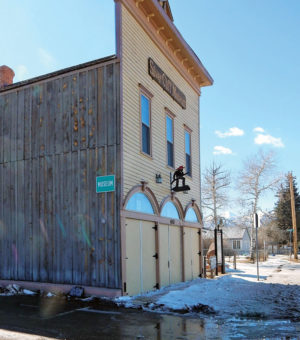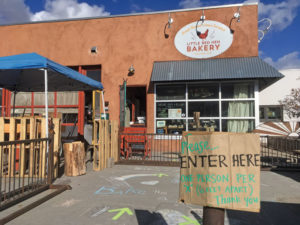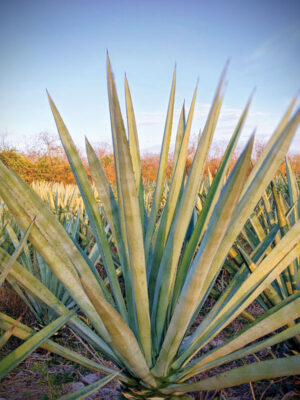By Peter Anderson
The Ute name for the Great Sand Dunes is sowapophe-uvehe—the land that goes back and forth. The Jicarilla Apache variation is ei-enyedi—the land that goes up and down. Either phrase, it seems, could apply to the whole valley on this windy spring day. Fortunately, there is a “back” and a “forth”, an “up” and a “down.” If that were not the case—if there was only a “forth” or only an “up”—this valley would no longer be a place, but would instead be an unpleasant weather phenomenon headed somewhere else. Custer County, I guess.
That this place is here, and remains here, comes as a great relief to those of us who are currently sheltering in it. Shelter, though, is a relative term. Sometimes you can find the place alright, but shelter is a different proposition. Yesterday, after I went downtown hunting and gathering, which at the moment involves putting on a mask and gloves and exploring the shelves of the Mercantile for the goods to keep my family fed, all the while keeping my distance from others who have ventured out on a similar mission, I noticed someone attempting to “shelter” on a bench across the street. All this person had as a shield against the wind was a sizable backpack. His top half was horizontally placed on the bench so as to benefit from the lee side of his pack, which appeared to contain everything needed for some extended travels. It looked to me like this person had come a long way and was too tired, for the time being anyway, to seek shelter anywhere else.
If I were at loose ends, maybe I too would come here. I’m sure a little town at the end of the road currently has plenty of appeal for anyone weary of navigating an especially viral urban landscape. I hear comments from time to time, mostly meant facetiously, about barricading the only road into town in the face of some imagined apocalypse, which reminds me of a story about a village where some of the neighbors were building bomb shelters. A boy asked his father why he wasn’t building one too. “Because,” his father said, “I don’t want to be in the position of closing the door on one of our neighbors if we don’t have enough space or food for them too.” In other words, a world without some measure of kindness, consideration, and neighborliness is an empty world. In my travels downtown the other day, I noticed a bunch of license plates from the Lone Star State. If I had a choice, I damn sure wouldn’t want to stay put in Houston or Dallas either.
But choice is the key word here. There are of course many people who have no choice other than to stay put, even if “put” isn’t a very good situation. Given the choice, I’d rather be “put” on a bench in the wind at the end of the road than shoulder to shoulder with my neighbors in a refugee camp or an urban tent village. I like people best when they are scattered some, as a cowboy poet once said, but there are plenty of people who, for any number of reasons, don’t even have that choice to make.
All of which is to say that I find myself perennially grateful these days for all the little decisions made over the years that landed me in a place where east is wild and steep, west is open and rural, and north and south consist of public and therefore mostly uninhabited common lands. Specific locations and directions may vary, but if you live in the region served by this publication, your place is a good place to shelter for some of the same reasons: mountains, public lands, and rural communities where you know your neighbors. So, yes, I am grateful for this place. Not only has it offered my family shelter and sustenance, but also solace—the solace of space and the solace of feeling some connection with, and therefore some hope from, the ground underneath our feet.
Peter Anderson recently retired from teaching in order to become a full-time word wrangler. He lives in Crestone.



